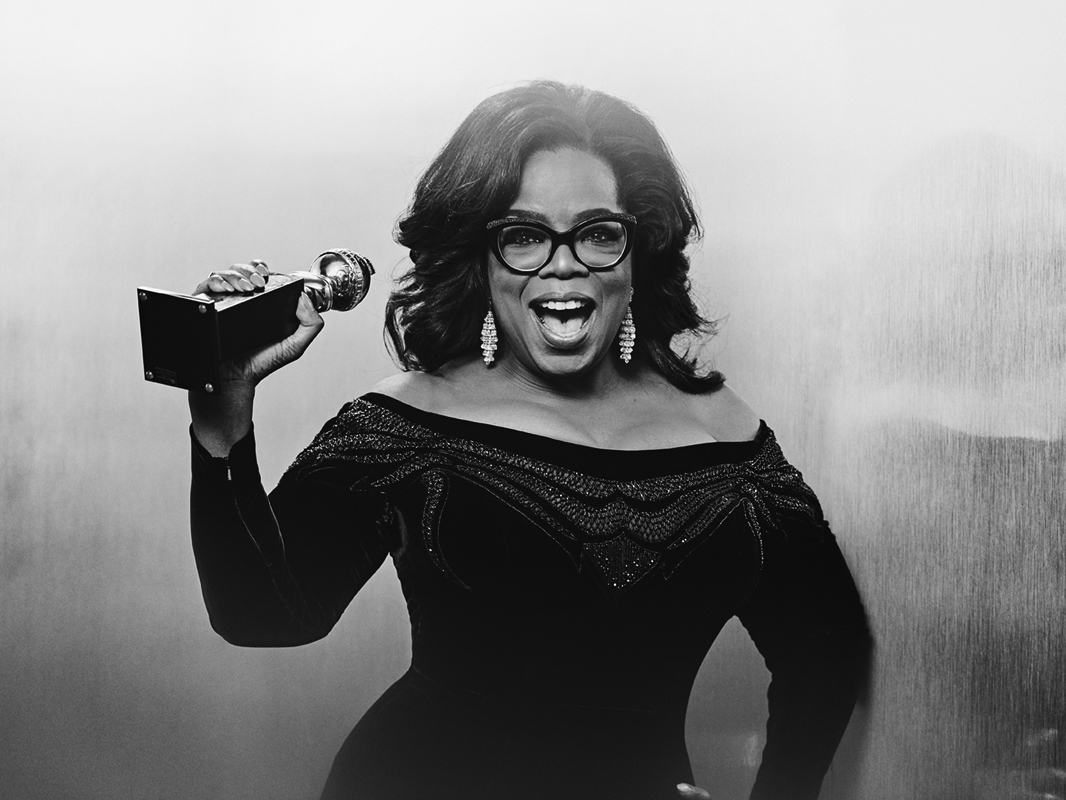
- Cecil B. DeMille
Ready for My deMille: Profiles in Excellence – Oprah Winfrey, 2018
Beginning in 1952 when the Cecil B. DeMille Award was presented to its namesake visionary director, the Hollywood Foreign Press Association has awarded its most prestigious prize 69 times. From Walt Disney to Bette Davis, Elizabeth Taylor to Steven Spielberg and 62 others, the DeMille has gone to luminaries – actors, directors, producers – who have left an indelible mark on Hollywood.
Over the course of her career in film and television, Oprah Winfrey has created an unparalleled connection with people around the world. Her accomplishments as a global media leader, producer, actress, and philanthropist have established her as one of the most influential and admired public figures today. And for that amazing record and for her contributions to entertainment in Film and Television she was our 2018 Cecil B. DeMille recipient.
For 25 years, Winfrey entertained, enlightened, and uplifted millions of viewers as host and producer of the top-rated The Oprah Winfrey Show. She has also produced countless television movies, and acclaimed feature films, such as Precious: Based on the novel Push by Sapphire, The Great Debaters, and Selma, which have challenged racial prejudice in America. As an actress, she has received widespread acclaim for her powerful performances in award-winning films such as The Color Purple and Lee Daniels’ The Butler.
Her personal fortune, estimated to be half a billion dollars, makes her one of the most powerful women in America. Forbes Magazine rates her the third highest-paid entertainer in the world, and her annual income is said to be in excess of $100 million a year. Her daytime show before she walked away from it reached an audience of twenty million who watched her on over 200 stations in thirty-two countries.
Even if she weren’t the richest and most influential woman on television, she has to be the most persuasive, having connected with countless people all over the world including dignitaries and world leaders.
Because of her passion for Nobel Prize winner Toni Morrison’s Pulitzer Prize-winning novel Beloved, she secured the screen rights as soon as it was published, but it took her ten years to get that film made. The early reviews were glowing, the audiences’ fervor not quite so much. At the time of its release at her HFPA press conference, we asked her, “Will audiences respond to its depiction of the horrors of slavery with anger, bitterness, or forgiveness?” “I feel no anger,” she answered. “I feel the need for all of us to move towards a sense of redemption. The past is bigger than all of us. Regardless of our background or our heritage or where our ancestors came from, we are here because of the bridge that was provided for us. The past is a bridge to this moment right now. So, it would be destructive to feel anger, because you must use your history to move forward.”
Today she states: “Over the years of the Oprah show, I did over 100 shows about racism. In all of those experiences, though, I don’t recall a moment quite like this one, because we find our nation on a precipice, a true tipping point. Is this the moment that will finally change our country, where people will recognize systemic racism for the problem and the evil that it is?”
Her personal record on uplifting people of color is unassailable. Her Oprah’s Angel Network has raised more than $80 million to fund charitable grants for aspiring women and children, and her partnership with Starbucks has raised over $21 million for youth education. Of course, her own story is living testament to how Black lives can matter.
Growing up in a poor town in Mississippi, Winfrey knew that education was her door to freedom. While still in high school, she landed a job on the radio which led to her getting a daytime talk show in Chicago which she made her own. She revolutionized the talk show format by breaking social taboos. Her emotionally centered approach soon made her a nationally syndicated phenomenon, and she used that platform to promoted literature, self-improvement, mindfulness, and spirituality.
At the height of her success, she accepted an acting role in Steven Spielberg’s The Color Purple for which she was nominated for both a Golden Globe and an Academy Award as Best Supporting Actress. She followed it with another starring role in The Women of Brewster Place and its TV spin-off Brewster, which she also produced.
When acting roles dried up, she segued into producing, resulting in two successful TV undertakings, a documentary Nine and a movie of the week Overexposed.
Three years later, the failure of her Beloved venture cost her $30 million of her own money. Undeterred she executive produced a number of television films, the most notable her version of Zora Neale Hurston’s 1937 novel Their Eyes Were Watching God, starring Halle Berry.
She went on to produced Denzel Washington’s maiden effort as a director The Great Debaters, and then partnered with Lee Daniels on Precious for which she received an Oscar nomination as producer. Four years later as an actress on Lee Daniels’ The Butler she received both BAFTA and SAG nominations as Best Supporting Actress.
She has since produced Ava DuVernay’s Selma for which she was Oscar-nominated and DuVernay’s When They See Us, for which she was Emmy nominated. In 2011 she created OWN, her own cable network, which has been responsible for countless hit TV shows including Queen Sugar now in its seventh season. She was the first recipient of the Academy of Television Arts & Sciences’ Bob Hope Humanitarian Award, was awarded a Kennedy Center Honor, the Elie Wiesel Legacy Award, and the nation’s highest civilian honor, the Presidential Medal of Freedom from President Barack Obama.
Reese Witherspoon proudly presented her with our Cecil B. DeMille award for her lifetime achievement, a record unmatched by anyone in memory.
Long may she prevail.

